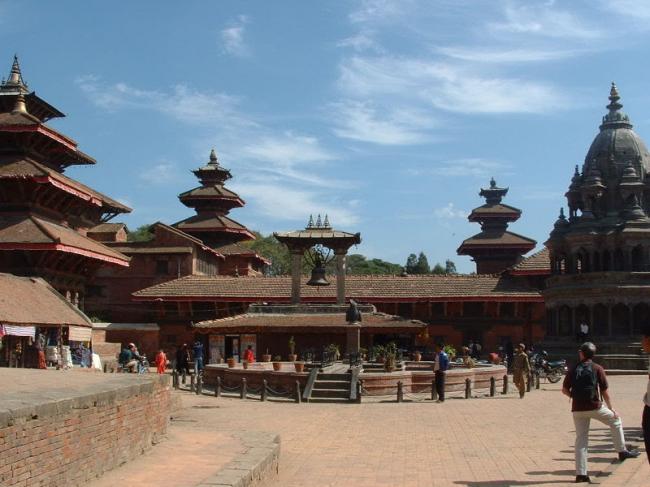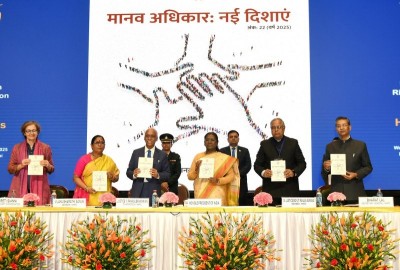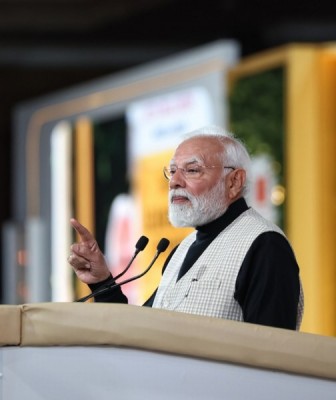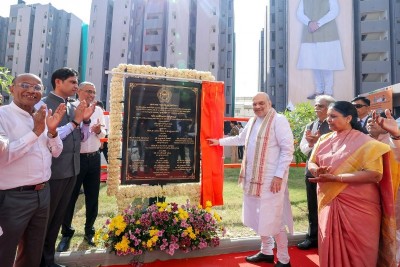
Persistent Polarization
On March 29, 2015, 42 persons, including 32 cadres of the 30-party alliance and 10 Policemen, were injured when sporadic clashes erupted between the agitating activists of the alliance and Police in different parts of the country.
On March 25, 2015, Police arrested five cadres of the All Nepal National Independent Students Union-Revolutionary (ANNISU-R), the student wing of the UCPN-M, for pelting stones at Finance Minister Ram Sharan Mahat's vehicle at Simpane in Kaski District, while Mahat was on his way to take part in a programme at Salyan Village Development Committee (VDC) in the District. No damage was reported.
On February 28, 2015, more than a dozen people were injured when Police lobbed teargas shells and used batons to stop demonstrators from advancing to the Parliament building during the first phase of the UCPN-M-led 30-party opposition alliance protest. Around 30,000 protesters staged demonstrations in different parts of Kathmandu, demanding that political parties reach a consensus on a new Constitution. Further, on March 15, the opposition alliance unveiled the programmes for its second phase of protests starting from March 19 to April 9, which included mass assemblies, demonstrations, sit-ins and general strikes.
It is useful to recall that the first Constituent Assembly (CA), constituted on May 28, 2008, with mandate to deliver the Constitution by May 28, 2010, was dissolved on May 27, 2012, after four extensions. Similarly, the second CA constituted on January 21, 2014, fixed the deadline for delivery of the Constitution as January 22, 2015, and missed it again as parleys between the ruling and the opposition parties to settle contentious issues through consensus derailed on January 19. The critical unresolved issues include the form of Government, federalism, judiciary and the electoral system.
As no consensus could be reached again, and the drafting of the Constitution missed yet another deadline, the ruling coalition threatened to move ahead to settle all issues through majority vote, as per the process provided in the Interim Constitution. On February 12, 2015, senior Nepali Congress (NC) leader and former Prime Minister Sher Bahadur Deuba declared that the Constitution would be drafted at any cost, despite the reluctance of the UCPN-M. Similarly, Deputy Prime Minister and Minister for Local Development Prakash Man Singh, while talking to journalists after the inauguration of the Salleri Chyalsa Hydel Project in Solukhumbu District on February 18, 2015, asserted that the Constitution would be promulgated through the voting process if the bid for consensus failed.
This was clearly unacceptable to the Maoists, as they would be completely outnumbered, given their poor strength in the CA. The Maoists, consequently, did what they were expected to - creating all manner of obstructions to the Constitution drafting process. Addressing a programme organized to announce a joint youth volunteer force in Kathmandu on February 12, 2015, UCPN-M Chairman Pushpa Kamal Dahal akaPrachanda warned that a parallel Government would be established at the Center if the ruling parties move ahead with the process of bringing a majority-based Constitution. Similarly, speaking at a Press Conference organized by UCPN-M-aligned Revolutionary Journalists Association in Kathmandu on February 15, senior UCPN-M leader and former Prime Minister Baburam Bhattarai also warned that a parallel CA would be constituted and an alternative Constitution would be drafted to establish a parallel 'People's Government'.
Separately, during a Press Conference in Kathmandu on February 13, 2015, Madheshi Janadhikar Forum-Nepal (MJF-N) Chairman Upendra Yadav warned, "Constitution cannot be promulgated by sidelining the 30-party alliance. Our protest programmes will destroy their egos." Likewise, Madheshi Janadhikar Forum-Loktantrik (MJF-L) Chairman Bijaya Kumar Gachhadar, at a Press Conference organised by Dhanusha Chapter of MJF-L on February 15, observed, "The Constitution sans consensus is not possible. If so, it would not sustain longer. Therefore, consensus is the way to address the problem." The NC and CPN-UML have a combined allocation of 388 seats in the CA. Their alliance with the Rashtriya Prajatantra Party (RPP) and Communist Party of Nepal, Marxist-Leninist (ML) gives them a total of 407 seats, slightly more than the two thirds majority in the 601-member CA that is required to pass the Constitution.
Meanwhile, on February 19, 2015, thinking it to be perfect time to fish in troubled waters, the 33-party alliance led by the Mohan Baidya-led Communist Party of Nepal-Maoist (CPN-Maoist) - which did not participate the November 2013 CA election and unsuccessfully attempted to disrupt the election - announced the 'revival' of the 33-party alliance to struggle for a consensus-based Constitution. The alliance has been demanding dissolution of the CA and formation of an all-party assembly to draft the Constitution.
Meanwhile, in a bid to give momentum to the unification of UCPN-M and Mohan Baidya-led CPN-Maoist two years and nine months after the two parties split, CPN-Maoist Chairman Mohan Baidya visited UCPN-M Chairman Pushpa Kamal Dahal at the latter's residence at Lazimpat in Kathmandu on March 15. The visit was the first formal meeting between the two parties on the reunification issue, and resulted in a decision to take the unification process ahead in an organized manner and to launch a joint agitation against the 'regression' on various outstanding Constitutional issues.
Significantly, the Supreme Court (SC) verdict of February 27, 2015, which prohibits the Commissions of Inquiry on Truth and Reconciliation Commission (TRC) and Commission of Enforced Disappearances (CED) from looking into cases that are sub-judice, has provided an opportunity to the Maoists to attempt to consolidate their position. The issue has brought the splinter Maoist parties together, as it has the potential to put some leading Maoists behind bars and lessen the probability of securing amnesty. UCPN-M has been demanding all war-era cases should be handed over to the newly formed TRC and CED. The UCPN-M, during a joint meeting held at the Mohan Baidya-led CPN-Maoist office in Kathmandu on March 22, formed a working alliance with five of its splinter parties - including the Baidya-led CPN-Maoist, the Pari Thapa-led CPN-Unified, the Mani Thapa-led Revolutionary Communist Party (RCP), the Matrika Yadav-led CPN (Maoist), and the Netra Bikram Chand-led CPN-Maoist - to oppose the SC verdict to revoke amnesty on certain war era cases that fall under the transitional justice mechanism. The parties decided to stage a nationwide demonstration on April 6, 2015, arguing that the ruling parties had breached theComprehensive Peace Agreement (CPA) and the Interim Constitution by not following the statute and the CPA in their true spirit. The meeting also decided to pile pressure on the Government for delaying the distribution of relief packages to war victims.
As the Maoists attempt to stack the odds in their favour, pressure has been mounting on the NC. On March 2, 2015, Communist Party of Nepal-Unified Marxist-Leninists (CPN-UML) threatened to walk out of the Government if the NC was not ready to push the ongoing Constitution writing process on a majority basis. Subsequently, NC and CPN-UML, during a meeting held at Prime Minister Sushil Koirala's official residence in Kathmandu on March 12, 2015, decided that they would not wait for the opposition alliance for very long, in the name of consensus.
However, on March 13, 2015, the ruling and opposition parties started fresh negotiations to secure consensus on the disputed issues, with a view to wrapping up the prolonged Constitution writing process by May 29, 2015. The ruling NC and CPN-UML held discussions in two groups. NC leaders met Madhesh-centric parties, while coalition partner CPN-UML had an interaction with the third largest party, UCPN-M, in a bid to seek consensus on federalism. However, little progress has been secured, as the Maoists demand a guarantee of the scrapping of the ongoing majority process in the CA, and a return to the consensus process, before any meaningful negotiation can take place, even as the ruling coalition agreed to put off the voting process indefinitely.
Meanwhile, tired of waiting for top political leaders to move ahead in the negotiations, CA Chairman Subash Nembang, on March 25, 2015, informed the political parties regarding his decision to call the next CA meeting on 29 March, urging the parties to reach a consensus by that date. CA meetings have not been held since February 12, 2015, in a bid to give opportunity for the parties to reach a consensus.
As the Maoists and their allies continue to obstruct the Constitution drafting process, the reason behind their obduracy was revealed by Baburam Bhattarai in no uncertain terms. Proposing a middle way solution to end the current political deadlock centered on the majority-based Constitution-writing process at an interaction in Kaski District on March 27, 2015, he noted, "There is dispute between the mandate of the revolution and the mandate of the election, and the Constitution will be unacceptable if it is promulgated without resolving the dispute through a new agreement."
Nepal continues to exist under the shadow of an unending threat of political turmoil, with the opposition refusing to negotiate while the 'majority process' remains an option in Constitution drafting, even as the ruling coalition refuses to forgo this option. UCPN-M has moved closer to the Mohan Baidya-led CPN-Maoist against this backdrop, and there are troubling signs that the Mohan Baidya faction may even reject the sanctity of the CA process. UCPN-M also remains unwilling to accept the realities of the electoral outcome and their relative insignificance in the CA, and continue to attempt to punch higher than their weight by returning to the streets. In such a polarized polity any smooth process of Constitution drafting remains unlikely.
Support Our Journalism
We cannot do without you.. your contribution supports unbiased journalism
IBNS is not driven by any ism- not wokeism, not racism, not skewed secularism, not hyper right-wing or left liberal ideals, nor by any hardline religious beliefs or hyper nationalism. We want to serve you good old objective news, as they are. We do not judge or preach. We let people decide for themselves. We only try to present factual and well-sourced news.







